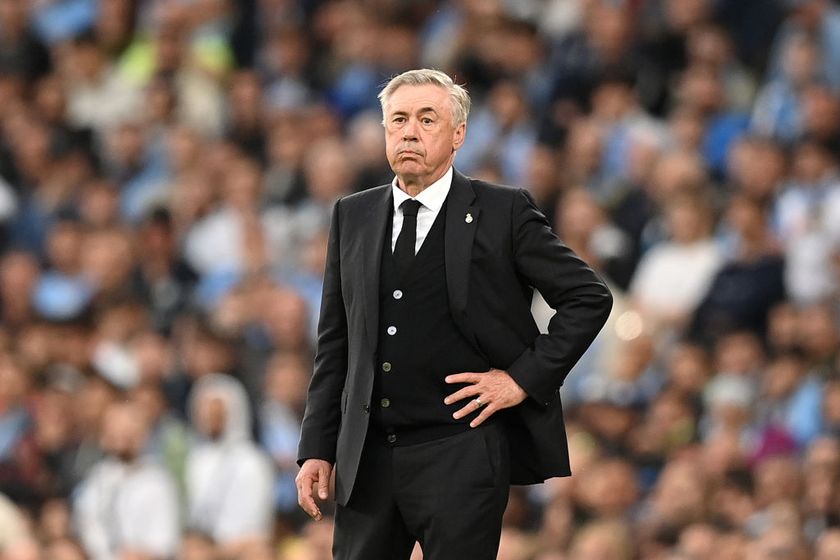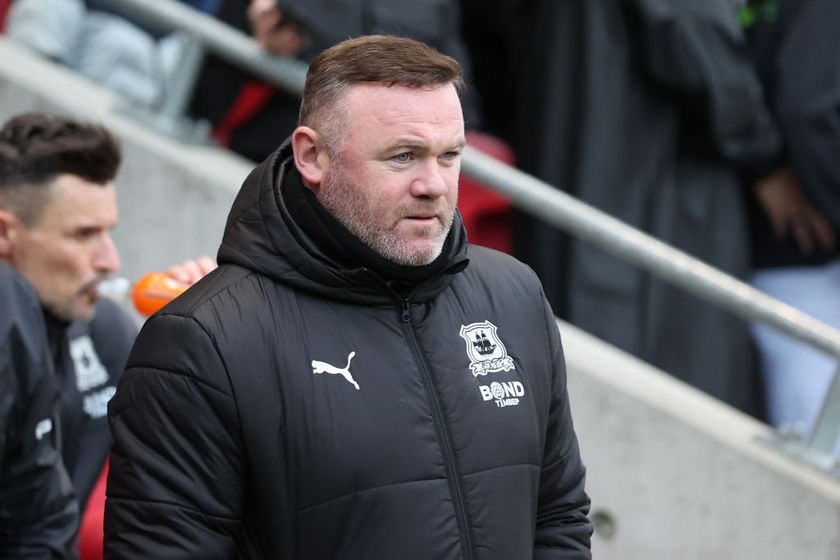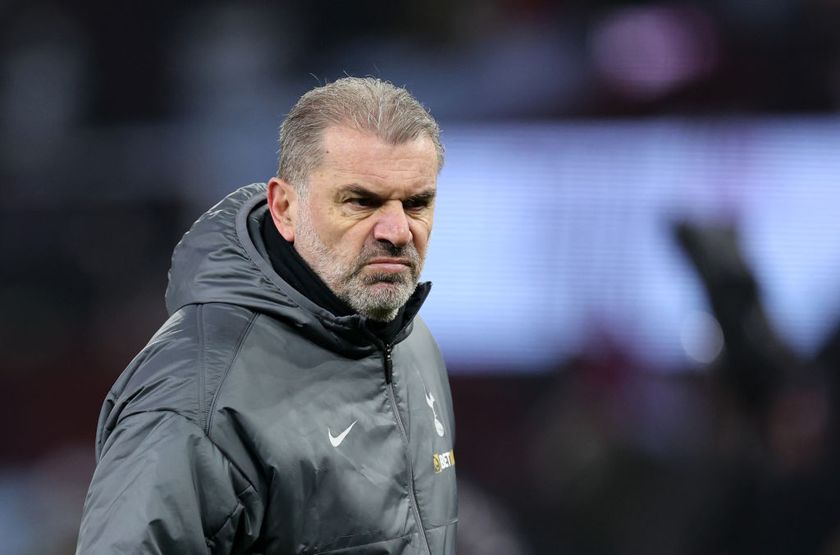Dortmund day trip: On the Südtribüne with England's disillusioned die-hards
Uli Hesse squeezes in next to Villa fans Jim and Tony for their take on Die Schwarzgelben's most famous attraction...
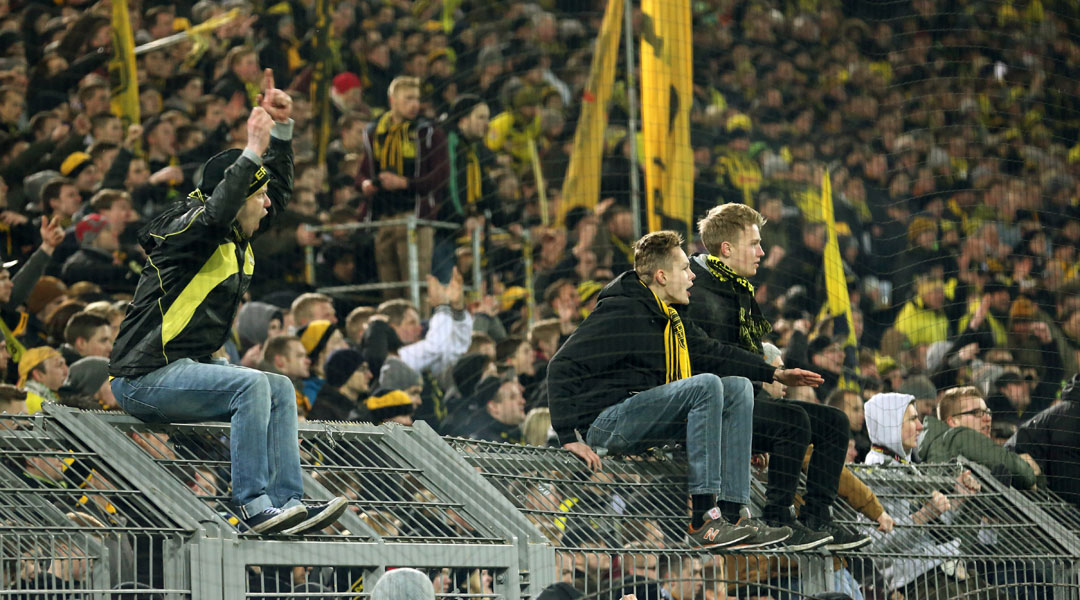
"All-seater stadiums have ruined football," says Jim. It's not a remark made on the spur of the moment. For one, Jim isn't the person to say anything rashly without giving it some thought first. Also, the game is long over. More than an hour has passed since Jim stood with 25,000 ecstatic supporters on what is probably the most famous terrace in the modern world of football, Borussia Dortmund's Südtribüne.
No, it's rather that Jim has seen that I'm taking notes and he wants to make sure I didn't miss what he just said. "I was telling Tony that all-seater stadiums have ruined football," he repeats. "I've heard people say this before, but I was never convinced of this. Today I am." Tony leans over to add a comment. He almost has to shout, as the din in this pub in downtown Dortmund is deafening. (That expression may be another cliché. But on days like this – derby days – you understand where it comes from.)
"You don't know what you've missed until you see it," he says. "You'll never get an atmosphere like that in England now. Impossible." He gestures towards his jacket. "I was showered in beer when the first goal went in. Brilliant! I loved every second. It brought back memories of my youth on the Holte End."
Villans on the loose
I was offered a ticket for the Stoke game last week. But I'm not going to pay £41 to see Stoke beat us
Jim and Tony come from Birmingham. They and their families have supported Aston Villa all their lives – in fact, Jim's wife travelled to Rotterdam as a teenager to watch the team win the 1982 European Cup Final against Bayern Munich – but now they hardly go to games anymore.
"I was offered a ticket for the Stoke game last week," says Jim, who lives only six miles from Villa Park. "But I said: I'm not going to pay £41 to see Stoke beat us."
By now you probably suspect that Jim and Tony belong to the section of English fans who are so disillusioned with the domestic game that they boycott the Premier League and instead watch their football in Germany. Just a few months ago, the BBC reported that Borussia Dortmund alone are "attracting more than 1,000 fans from England to every home match".
Get FourFourTwo Newsletter
The best features, fun and footballing quizzes, straight to your inbox every week.
When I ask Jens Volke, one of the club's five (!) supporter-liaison officers, if the figure is really that high, he says he can neither confirm nor deny it since the club don't keep such stats. However, his colleague Daniel Lörcher reminds me that Ryanair introduced matchday specials from London Stansted to Dortmund back in November because, as the company's spokesman Robin Kiely said, "Borussia Dortmund have built up a sizeable fanbase in the UK".
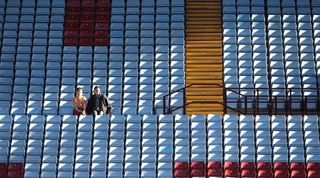
But while Jim and Tony did travel to Dortmund on one of those specials, they are not really football refugees seeking a fortnightly exile in the fan-friendly Bundesliga. (Or not yet.) The story of how they came to watch Borussia play fierce rivals Schalke from the terraces is quite simple.
A few months ago, they travelled from Birmingham to Soest, a small city in Westphalia where Tony was stationed while serving in the army. Realising that Soest is only 30 miles east of Dortmund, they half-jokingly said they should come back one day to watch a game there. Whereupon a German friend mentioned he might be able to help with the tickets.
Because make no mistake, you need some help when you want to watch Dortmund play. Although Borussia's ground can hold more than 80,000 people for domestic games (obviously, the terrace is temporarily turned into a seated area for matches in Europe), it's almost always sold out, not least because there are no fewer than 55,000 season-ticket holders.
So finding a ticket isn't always easy. And, paradoxically, the most valuable and sought-after of those tickets are the cheapest ones – the tickets for the standing area.
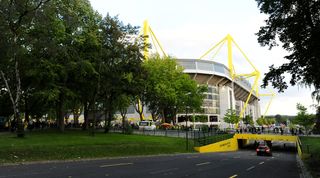
You sometimes read that the Bundesliga is such a heaven for supporters that you can go to watch a famous and exciting team like Borussia for less than £12. In theory, that's true. In practice, though, you'll never land such a ticket. They are like gold dust in Dortmund, where many people actually prefer to stand.
In fact, when you notice empty seats at Dortmund's ground, you shouldn't assume that those tickets weren't sold. What happens quite often is that someone pays a lot of money for a really good seat, but then tries to sneak past the stewards and onto the terrace.
So when Jim and Tony wax lyrically about a match experience that almost literally left them speechless while it lasted, it's worth noting that theirs was unusual even by German standards.
To begin with, Tony's friend miraculously managed to organise tickets for the terrace. What's more, he didn't do it for any old game but for the match which is still the most important one of the season for any long-time Dortmund fan – the derby against Schalke.
Derby day
It's a high-risk game, of course, so approaching the ground we walk past countless policemen in combat gear and can hear the helicopters circling above our heads. Tony feels reminded of a riot in Birmingham a few years back when Villa played at City. However, there will be no trouble today, although the first 10 minutes of the game are tense. Just a stone's throw below us, masked Dortmund ultras scale the fences and brandish blue replica shirts or flags – stuff they have pilfered from Schalke fans.
In the world of the ultras, this is a very strong provocation. You can see opposing fans surge forward in the North Stand. It's a troubling sight, because we're not talking about a small group.
There are at least 8,000 Schalke fans in the ground. Yet order is restored soon and the home fans concentrate on the game rather than on showing off.
That's mainly because their team puts in a quite literally breathtaking performance. Dortmund have had a nightmare season so far and were in last place as recently as early February. Schalke, meanwhile, are sitting in a Champions League slot. Under former Chelsea coach Roberto Di Matteo they have picked up a defensive, cautious style that isn't easy on the eyes but yields result.
So it comes as a surprise that Dortmund not only dominate the match but create an almost absurd amount of excellent chances. "I don't care who wins," Jim had told me as we walked towards the ground, "I just want to see a good game." But now, surrounded by 25,000 people who are screaming themselves hoarse in an attempt to finally force the ball across the line, I suspect he's no longer fully impartial.
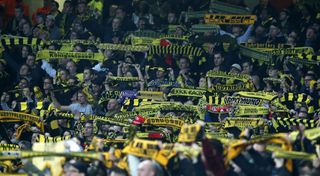
In fact, the atmosphere proved to be infectious even before the game had started. When, a few minutes before kick-off, the first notes of You'll Never Walk Alone came over the PA, Tony raised an eyebrow in astonishment, then let out a laugh. I explained that most people in Germany don't realise this is a Liverpool song; they consider it a universal football tune. A few moments later, I could see Tony mouthing the words. "I've never sung it before," he later tells me. "And never will again."
Great ground, but terrible toilets. They never get this right anywhere
At half-time, the game is still scoreless. After an afternoon filled with surprises for the two Englishmen – from how early many fans arrive at the ground to them singing a Liverpool anthem with stirring gusto – it's now my turn to be stunned. Tony and Jim decide to go to the toilets. That takes considerable courage because it means they have to navigate their way through a jam-packed terrace twice.
To my surprise, they return safely and in time for the second half. "Great ground," says Jim. "But terrible toilets. They never get this right anywhere."
There is no change to the game's script after the restart. With an hour gone, Dortmund have racked up 21 shots on goal to Schalke's two. The people around us are coming close to despair and you can sense that many begin to fear this will be another in a long line of games this season in which Dortmund waste chance upon chance and then get hit on the break. Which, in its own way, only adds to Tony's and Jim's exciting afternoon. Because when the goal finally comes, with 12 minutes left on the clock, the mixture of joy and relief is so strong that there's really no other word for it – the entire terrace erupts. Tony is not the only person on this stand to be showered with beer, but just like everyone else he couldn't care less.
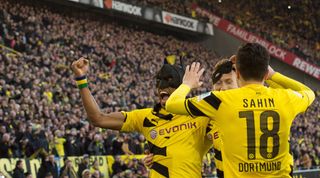
Dortmund add two more goals for a well-deserved 3-0 derby win. Hardly anyone leaves the terrace after the final whistle, because they are waiting for their team. The players walk over to the stand and celebrate together with their most fervent fans. Jim remarks something to the extent that pampered Premier League players would never do something like this. I tell him one cannot be sure.
When Rául joined Schalke from Real Madrid, nobody expected him to like this particular interaction with the fans, let alone participate in it. But eventually the global superstar even climbed onto the fan stand and grabbed a megaphone to lead a chant.
Later, in the pub, Jim and Tony finally have some time to reflect on what they have seen and what it means. "It was a great experience," says Tony. "I can now understand why people would get season tickets here and then fly over every second week. It was one of the best atmospheres I've ever been in at a football game. And it's all to do with the terrace. Standing makes all the difference."
Jim nods. "If it's done properly, standing is safe," he says. "And the fans on that terrace are mad. Really passionate. But what I liked most was that it wasn't just the terrace where people were singing. All the stands were joining in."
Then, while I'm scribbling into my notebook, he turns to Tony and tells him that all-seater stadiums have ruined football.
